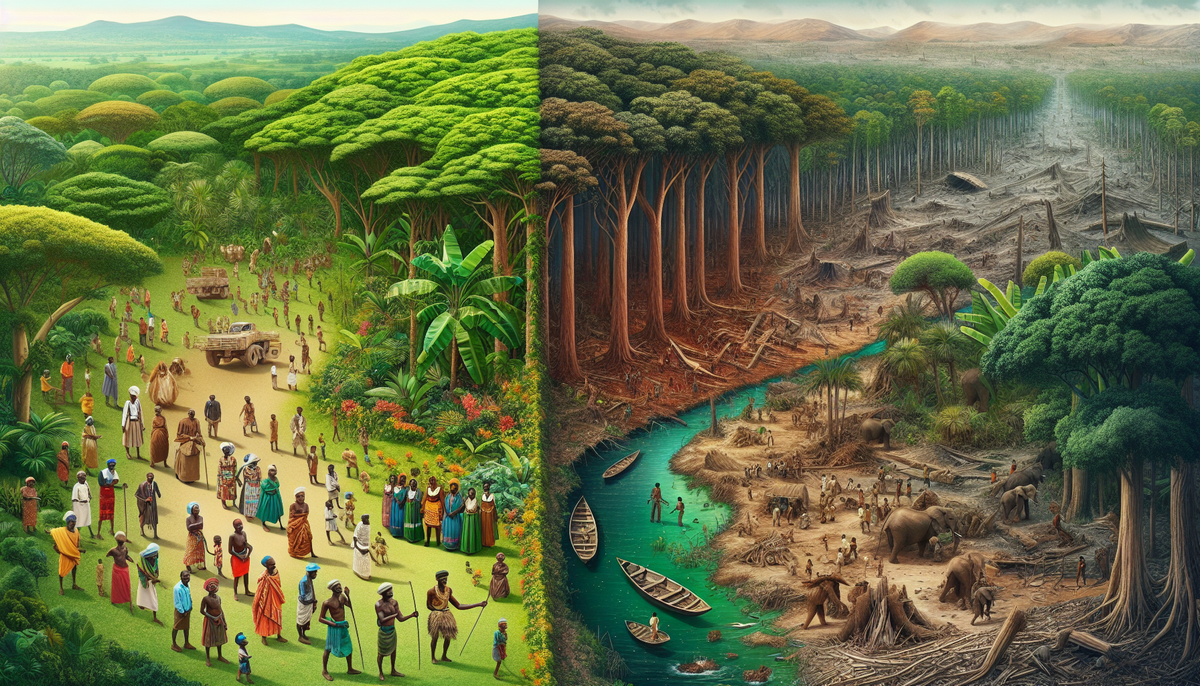Deforestation in Africa has emerged as a significant environmental issue, deeply intertwined with the continent's historical, economic, and cultural dynamics. Over the centuries, vast forests have been cleared to make way for agriculture, urban expansion, and commercial logging, driven by both local needs and global demands. Africa, rich in biodiversity, has seen its forests diminish not only in size but also in ecological value, affecting countless communities that depend on these natural resources for their livelihoods.
The historical roots of deforestation can be traced back to colonial exploitation, where colonial powers prioritized resource extraction, often disregarding the social and environmental consequences. This set a precedent for unsustainable practices that continue to affect various regions today. In many African countries, forests serve multiple purposes, from providing timber and fuel wood to offering essential ecosystem services, such as carbon storage and water regulation.
As deforestation progresses, the implications extend beyond environmental degradation. Many African communities face increased poverty, decreased food security, and cultural disintegration as their ancestral lands are stripped of vital resources. Understanding the complexities of deforestation is crucial in addressing the challenges faced by communities and fostering sustainable practices that promote both economic growth and environmental preservation.
Colonial logging practices played a pivotal role in shaping the socioeconomic landscape of Africa, leaving an indelible mark on its communities and environments. During the colonial era, European powers exploited Africa's rich timber resources primarily for export, driven by high global demand for quality woods. Forests were systematically logged to fuel the colonial economies, often with little regard for sustainable practices or the rights of local populations.
These operations frequently disregarded traditional land use and management systems, leading to displacement and loss of livelihoods for indigenous communities. Unequal power dynamics ensured that profits benefited the colonizers while locals faced economic marginalization. Many communities depended on forests for food, shelter, and medicine; the loss of trees not only dismantled these resources but also eroded cultural practices linked to the land.
Socioeconomic effects of colonial logging can still be felt today. Rural communities have experienced increased poverty, as the depletion of forest resources constrains income-generating opportunities. Additionally, the environmental degradation has led to diminishing ecosystem services, such as soil fertility and water purification, further straining local economies. Therefore, understanding these historical logging practices is essential for addressing current challenges and promoting equitable and sustainable development in African communities.
The repercussions of deforestation extend beyond immediate ecological degradation, significantly impacting the climate and, consequently, rural villages across Africa. As forests are cleared, carbon dioxide previously stored in trees is released into the atmosphere, contributing to global warming and climate change. This alteration in climate patterns manifests in unpredictable weather events, such as prolonged droughts, erratic rainfall, and rising temperatures, all of which pose substantial threats to rural communities reliant on agriculture.
For many villages, agriculture is the backbone of the economy and the primary source of sustenance. Climate-induced changes hinder crop yields and threaten food security, as staple crops struggle to adapt to shifting climatic conditions. Farmers face increasingly difficult decisions regarding planting times and crop varieties, often leading to reduced harvests and economic instability.
Additionally, the degradation of ecosystems affects water sources, exacerbating the challenges faced by rural populations. As forests disappear, the natural water cycle is disrupted, leading to decreased water quality and availability. Villagers may find themselves competing for dwindling resources, resulting in heightened tensions and conflicts. Consequently, understanding the climate consequences of deforestation is vital for developing adaptive strategies that ensure the resilience and sustainability of rural African communities in a changing world.
Deforestation in Africa has led to alarming rates of biodiversity loss, profoundly affecting local ecosystems and the communities that depend on them. The rich flora and fauna of African forests are critical not only for maintaining ecological balance but also for providing essential resources for traditional medicines. Many rural communities have relied on these natural remedies for centuries, drawing upon the diverse plant species found in their surrounding environments for healing and wellness.
As forests are destroyed, countless plant species face extinction, severely diminishing the pool of medicinal resources. The loss of biodiversity disrupts the delicate relationships between plants, animals, and humans, compromising the traditional knowledge systems that have been passed down through generations. Many indigenous practices are intimately connected to the rich tapestry of local biodiversity, and the disappearance of specific plants can dismantle entire health systems rooted in these traditions.
Moreover, the reduction of biodiversity also affects agricultural practices, as various crops rely on healthy ecosystems for pollination and pest control. The decline in species diversity can result in lower resilience to pests and diseases, further threatening food security and community health. Hence, safeguarding biodiversity is crucial not only for environmental sustainability but also for preserving cultural heritage and traditional medical practices within African communities.
The impacts of deforestation on indigenous cultures in Africa are profound, leading to significant cultural disruption and displacement. Many indigenous communities have long-standing connections to their ancestral lands, which are often rich in traditional knowledge, customs, and practices directly tied to the surrounding forests. The removal of these natural environments not only erodes the resources they depend on for survival but also dismantles the very fabric of their cultural identity.
As logging and agricultural expansion invade these territories, indigenous peoples frequently find themselves forcibly relocated from their homes. This displacement disrupts their traditional ways of life, separates them from their historical lands, and undermines their social structures. The loss of access to sacred sites, hunting grounds, and medicinal plants diminishes cultural practices and knowledge transmission, threatening the survival of unique languages and traditions.
Additionally, many displaced communities face challenges in adapting to new environments, often leading to poverty and social marginalization. The shift towards urban areas or unfamiliar lands can further alienate them from their cultural roots, resulting in a loss of community cohesion. Recognizing and addressing the impact of deforestation on indigenous cultures is essential for promoting social justice, cultural preservation, and a more sustainable approach to land use across Africa.
In response to the accelerating rate of deforestation in Africa, contemporary policies and restoration efforts have emerged as essential strategies to combat environmental degradation and promote sustainability. Many African nations are increasingly recognizing the importance of integrating conservation practices into their development agendas. Policies aimed at reducing deforestation focus on sustainable forest management, reforestation, and afforestation initiatives, encouraging communities to adopt practices that balance environmental health with economic needs.
Regional agreements, such as the African Forest Landscape Restoration Initiative (AFR100), aim to restore 100 million hectares of degraded land by 2030, fostering biodiversity, enhancing carbon sequestration, and improving livelihoods. These restoration efforts often emphasize community involvement, ensuring that local populations are engaged in decision-making processes and benefit from the restoration of their ecosystems.
Additionally, countries are increasingly adopting legal frameworks that protect forests and promote sustainable land-use practices. Enforcing policies that combat illegal logging and land conversion can safeguard critical habitats and promote responsible resource management.
However, challenges persist, including inadequate funding, weak enforcement mechanisms, and the need for capacity building. To be effective, contemporary policies must not only aim to restore ecosystems but also address the socioeconomic needs of local communities, creating a holistic approach that fosters both environmental health and human well-being.
Community-led conservation initiatives across Africa have emerged as powerful success stories, demonstrating the effectiveness of local stewardship in preserving ecosystems and enhancing livelihoods. One notable example is the **Community-Based Natural Resource Management (CBNRM)** program in Namibia. This approach empowers local communities to manage their natural resources, allowing them to benefit economically from sustainable tourism and conservation efforts. As a result, Namibia has witnessed a significant increase in wildlife populations, particularly elephants and rhinos, while local communities have gained financial incentives to protect these vital species.
In Kenya, the **Maasai Mara Wildlife Conservancies** model exemplifies community-led conservation success. Here, Maasai pastoralists collaborate with conservation organizations to manage wildlife habitats while maintaining their traditional pastoral lifestyles. This partnership has led to improved wildlife management practices and increased income from eco-tourism, fostering a sense of ownership and responsibility among the Maasai people for their environment.
Similarly, the **Ghanaian Forestry Commission** has partnered with local communities to implement forest restoration projects, resulting in the successful replanting of native tree species and the revitalization of vital ecosystems. These community-led initiatives highlight the critical role that indigenous knowledge and local engagement play in fostering effective conservation strategies, ultimately leading to healthier ecosystems and improved community resilience.




